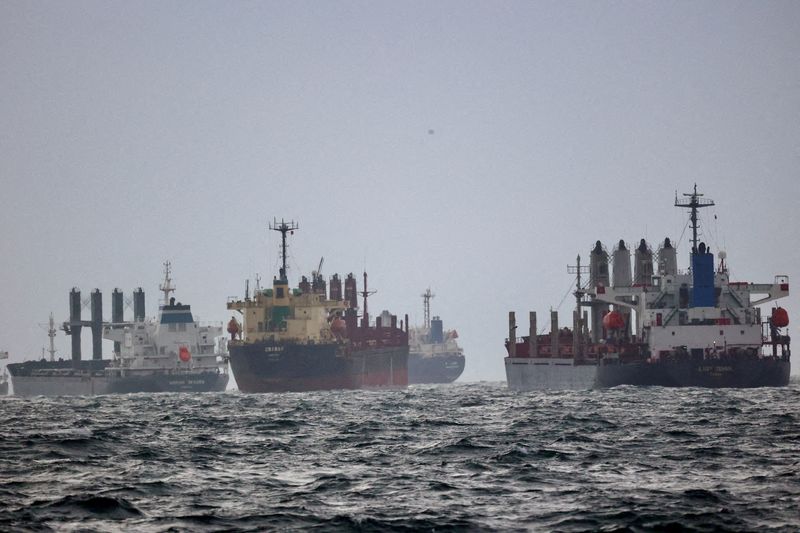Black Sea grain talks continue as Russia seeks 60-day renewal
2023.03.14 08:16
2/2

© Reuters. FILE PHOTO: Vessels are seen as they await inspection under the Black Sea Grain Initiative, brokered by the United Nations and Turkey, in the southern anchorage of the Bosphorus in Istanbul, Turkey December 11, 2022. REUTERS/Yoruk Isik//File Photo
2/2
MOSCOW (Reuters) -Talks continue to extend a deal to allow grain shipments from Ukraine’s Black Sea ports ahead of a deadline later this week, the United Nations and Turkey said on Tuesday, after Kyiv rejected a Russian push for a reduced 60-day renewal.
Since Russia and Ukraine signed the U.N.-backed Black Sea Grain Initiative in Turkey on July 22, millions of tonnes of grain and other food products have been exported from Ukrainian ports, helping to lower global food prices from record highs.
After Russia on Monday suggested allowing the deal to be renewed for 60 days, half the term of the previous renewal, the TASS news agency cited Russia’s Deputy Foreign Minister Alexander Grushko as saying on Tuesday that a deal had been agreed for a 60-day extension.
“Indeed, the deal has been extended – it has been agreed that it has been extended for 60 days,” the TASS news agency cited Russia’s Deputy Foreign Minister Alexander Grushko as saying on Tuesday.
It was not immediately clear how the deal could be extended for half of the previous duration of 120 days.
Turkey, which facilitated the deal alongside the U.N., said in a defence ministry statement that Moscow had agreed to back a 60-day extension to the deal but that talks continued.
A U.N. spokesperson said “informal dialogue” between the organisation and parties to the deal continued, though in-person talks with Russia had ended in Geneva.
Ukraine said it will stick to the terms of the previously agreed deal based on a 120-day duration that can be renewed.
“We will follow the agreement strictly,” a senior Ukrainian government official told Reuters. The official declined to be identified.
The Kremlin later repeated previous Russian criticism of the deal that it does not address obstacles to its own food and fertiliser exports, with spokesman Dmitry Peskov saying the deal could not “stand on one leg”.
Russia has said that, although the West has not explicitly targeted its agricultural exports, sanctions on its payments, logistics and insurance industries have created barriers.
As grain markets have anticipated an extension of the Black Sea agreement after the current term expires on March 18, U.S. and European wheat futures have fallen to their lowest in over a year in recent days, with future market direction hanging on news of any deal, traders said.
“Investment funds think that if there is no halt to the corridor, then supply remains healthy. But they’re very short in wheat and if there’s a problem, they may have to rush to cover positions,” a European trader said on condition of anonymity.








